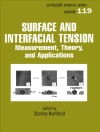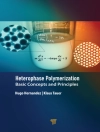Inspired by the leading authority in the field, the Centre for Process Systems Engineering at Imperial College London, this book includes theoretical developments, algorithms, methodologies and tools in process systems engineering and applications from the chemical, energy, molecular, biomedical and other areas. It spans a whole range of length scales seen in manufacturing industries, from molecular and nanoscale phenomena to enterprise-wide optimization and control. As such, this will appeal to a broad readership, since the topic applies not only to all technical processes but also due to the interdisciplinary expertise required to solve the challenge.
The ultimate reference work for years to come.
İçerik tablosu
Prodess Modelling – Putting Corporate Knowledge to Work
Modelling of Polymerisation Processes
Modelling of PEM Fuel Cells
A Generic Modelling Framework of Pressure Swing Adsorption Processes
Modelling of Biological Systems
A Framework for the Modelling of Reactive Separations
Modelling of Crystallization Processes
Modelling Multi Stage Flash Desalination Process – Current Status and Future Development
Dynamic Modelling of Complex Reactive Separation Processes
Dynamic Modelling of Disease Progression with Emphasis on Multi-Scale Modelling of Systemic Inflammation in Humans
Dynamic Modelling and Simulation for Robust Control of Distributed Bioprocess Systems
Dynamic Model Building Using Optimal Identification Strategies, with Applications in Bioprocess Engineering
Multiscale Modelling of Transport Phenomena in Biological Systems
Synthetic Biology: Dynamic Modelling and Construction of Cell Systems
A Process Systems Engineering Approach to the Development of an Artificial Pancreas for Subjects with Type-1 Diabetes Mellitus
Dynamic Multiscale Modelling – An Application to Granulation Processes
Yazar hakkında
Efstratios N. Pistikopoulos is a Professor of Chemical Engineering at Imperial College London and Director of its Centre for Process Systems Engineering (PSE). He graduated in Chemical Engineering from Aristotle University of Thessaloniki, Greece and was awarded a Ph D from Carnegie Mellon University, USA. He has authored/ co-authored over 200 publications, holds editorial positions on several editorial boards and has been involved in over 50 major research projects and contracts. Prof. Pistikopoulos is co-founder and Director of two successful spin-off companies stemming from his research at Imperial, Process Systems Enterprise (PSE) Limited and Parametric Optimization Solutions (PAROS) Limited and consults widely to numerous process industry companies.
Michael C. Georgiadis is Associate Professor in the Department of Engineering Informatics and Telecommunications at University of Western Macedonia, Greece and honorary research fellow in the Centre for Process Systems Engineering at Imperial College London. He was manager of academic business development for Process Systems Enterprise Ltd. He obtained his Chemical Engineering Diploma from Aristotle University of Thessaloniki, Greece and an MSc and Ph D From Imperial College London. Dr. Georgiadis has authored over 55 papers and two books. He has a long experience in the management and participation of more than 20 collaborative research contracts and projects and consults to Process Systems Enterprise Ltd and Parametric Optimization Solutions Ltd.
Vivek Dua is a Lecturer in the Department of Chemical Engineering at University College London. He holds a degree in Chemical Engineering from Panjab University, Chandigarh, India and MTech in chemical engineering from the Indian Institute of Technology, Kanpur. He joined Kinetics Technology India Ltd. as a Process Engineer before moving to Imperial College London, where he obtained his Ph D in Chemical Engineering. He was an Assistant Professor in the Department of Chemical Engineering at Indian Institute of Technology, Delhi before joining University College London. He is a co-founder of Parametric Optimization Solutions (PAROS) Ltd.
Process Systems Enterprise (PSE), provider of the g PROMS advanced process simulation and modelling environment, is the 2007 winner of the Royal Academy of Engineering’s Mac Robert Award. The award, the UK’s most prestigious for engineering, recognises the successful development of innovative ideas. The PSE team was presented with the Mac Robert gold medal by HRH Prince Philip.












